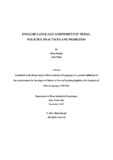English language assessment in Nepal: policies, practices and problems
Abstract
The present study focused on the test materials and curriculum policies, as well as the
perspectives of the testers and moderators, to examine how the English language test for
secondary education examinations in Nepal is developed, what principles and criteria govern
test production, and what factors impact this process. Participants were selected using a
purposive sampling method. The findings indicated a range of circumspection, compliance,
and context-aware methods, demonstrating the continuation of questionable test design
procedures and practices. These replies backed ritualized design approaches that downplay
test validity and reliability worries and hide the fundamental principles of the educational
system by categorizing students into achievers and failures. Importantly, the findings revealed
the need to scrutinize the test design itself. Future research is also recommended based on
factors and stakeholders.

